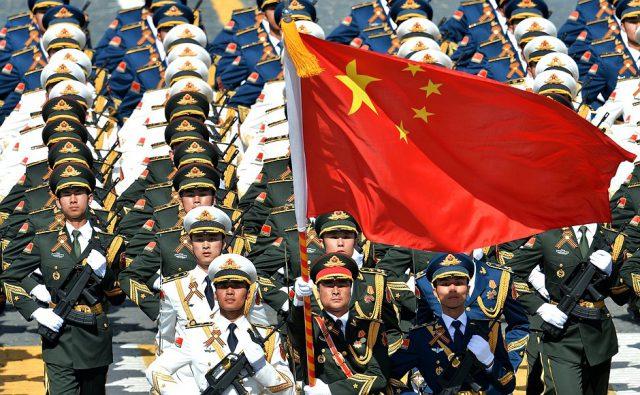
Some strange things have been said about the Australia–China relationship during recent weeks.
Some commentators have blamed the Turnbull government for mishandling relations with Beijing and for making too much of a fuss about China’s militarisation of the South China Sea.
John Howard has suggested that, while there will always be differences between the two countries, current tensions could be remedied by face-to-face meetings between the national leaders. Bob Carr has said that critics of Beijing’s influence operations in Australia want to spark a new cold war.
The reality is that all of these perceptions are flawed. The Center for Strategic and Budgetary Assessments (CSBA) in Washington released a new report, Countering comprehensive coercion, which makes clear that China has been conducting political warfare–type operations against Australia for over a decade. So it’s time for Australians to understand that it’s not a question of whether we want to fight such battles. The communist regime in Beijing is already doing so against us. The most important question is how we can best defend ourselves.
There’s a great deal of evidence on the public record for all to see. Senior officials have told parliamentary committees that subversion and influence operations are now more intense than at the height of the Cold War in the early 1980s. There are reports of Chinese students being tasked to suppress anti-Beijing views; the Chinese Communist Party’s funding of business people, politicians, trade unionists and others who then argue Beijing’s case; large-scale media operations including Beijing-produced monthly supplements in major Australian newspapers; extensive cyber operations against Australian governments, corporations and research institutions; aggressive attempts to recruit spies and agents of influence; and operations by an increasingly powerful Chinese military to establish footholds in important locations in the Pacific and Indian oceans.
Some Australians assume that the Chinese regime’s operations in Australia are simply a succession of isolated or random incidents. The reality is that the Chinese agencies conducting these operations are tightly controlled by the Communist Party leadership. The primary organisations of relevance—the United Front Work Department, the Propaganda Department, the Ministry of State Security, and the political warfare and propaganda divisions of the People’s Liberation Army—are all directly controlled by the Politburo Standing Committee, chaired by Xi Jinping.
The Chinese regime is highly motivated. It’s driven by a powerful narrative that seeks to overcome what the Communist Party sees as China’s ‘century of humiliation’ or subservience to the West and delivers the ‘China dream’ of restoring the nation’s international pre-eminence. At last October’s National People’s Congress, President Xi emphasised his determination ‘to restore China as a global leader in terms of comprehensive national power and international influence’.
The regime in Beijing is committed to building China’s international power to rival and then surpass that of the United States. China’s leaders of the 1980s and 1990s who spoke of ‘a peaceful rise’ and of Beijing ‘biding its time’ are long gone.
A feature of Beijing’s operations against Australia and its allies is that they’re a reflection of the regime’s oppressive surveillance operations and police-state behaviour at home. Within China there’s no independent rule of law, little respect for human rights and no tolerance of dissenting behaviour. Many thousands of citizens are arbitrarily detained in ‘re-education camps’. The same culture of aggressive intrusion, heavy-handed interference and disrespect for international law characterises many Chinese agency operations in Australia and throughout our region.
The CSBA report tracks the development of these Chinese operations and includes a revealing discussion of translated papers from a United Front Work Department conference that was conducted in 2015. In these and other documents, the Chinese have no hesitation in describing their operations against Australia and other allied countries as ‘political warfare’. Indeed, Xi has talked openly about these political warfare operations being one of his ‘magic weapons’.
This Chinese campaign is a major challenge for the Australian national security community and, indeed, for Australian society at large. The communist regime has been actively exploiting the openness and freedoms that are part of our DNA. What’s more, all indications are that these hostile operations are likely to be intensified in the period ahead and will be sustained for many years.
The CSBA report starts a discussion about what we need to do.
First, more Australians need to do their homework. While these developments are well understood by our national security officials, many people in business, education, the media and elsewhere have yet to appreciate the nature and scale of the challenge, and quite a few are in a state of denial. These regime operations present a serious threat to our sovereignty and to the freedoms most of us cherish.
Second, we need to appreciate that in the face of this political warfare campaign, it cannot be business as usual. The Turnbull government’s tightening of counterespionage legislation will help, but it’s not enough. We need to work hard with our allies and partners to devise means of defending ourselves against these political warfare operations. We also need to deter Chinese escalation and impose costs on Beijing for continuing its coercive operations.
Perhaps the biggest challenge of all will be to properly brief Australians and organise citizens to play their part in defending our democracy. Beijing is leveraging trade, investment, financial, political, diplomatic, news media, social media, educational, social, cyber, espionage, military and paramilitary and other instruments to coerce Australian compliance. Australia’s heavy reliance on diplomacy and military instruments, with modest economic and aid activity, is clearly being overwhelmed. Developing an effective national response will require national leadership and sharpened priorities for relevant government agencies.
Australia needs to lift its game. There’s a great deal to do.